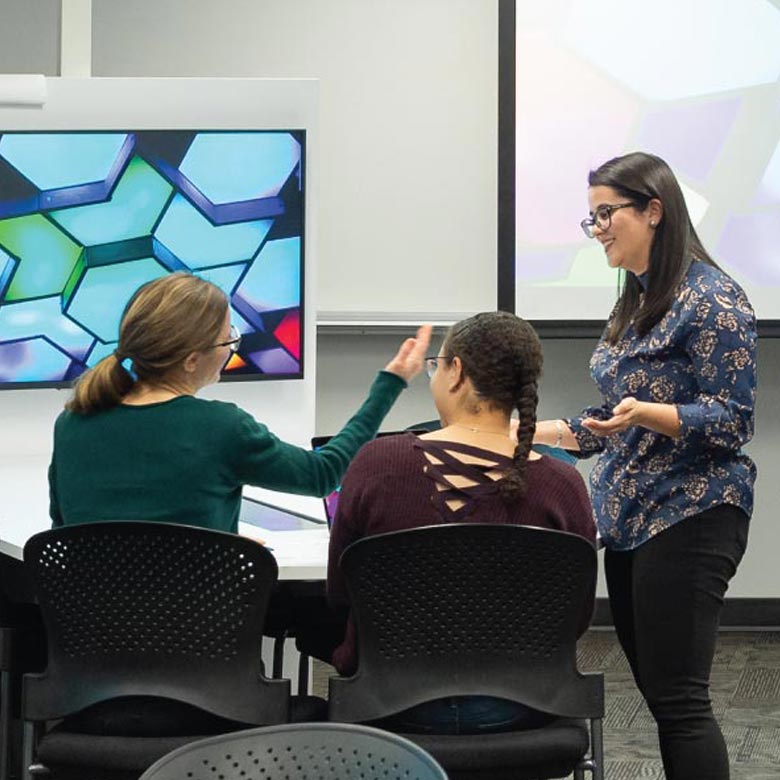What we teach and how
Librarians can provide instruction in-class, online, or through asynchronous resources. Sessions can be general, customized to course content, or co-led. We can provide single sessions or multiple, integrated or embedded sessions.
Library Orientations and Foundational Skills
Library Orientations
- Typically aimed at first year, or new UBC Okanagan students, including those at the graduate level
- Designed to orient students to the library and its services
- Can be tailored to a specific discipline or course
Foundational Skills
- Building search strategies
- Identifying where to search for a particular discipline or subject area
- Analyzing and evaluating sources at the university level
Advanced library skills instruction
Advanced Library Skills Instruction
Workshops or sessions focused on providing students with advanced research skills to be successful at upper-year undergraduate or graduate level research
Can include:
- Interdisciplinary research strategies and components
- Developing robust search strategies across multiple platforms
- Systematic reviews
Asynchronous resources
Foundational Library Skills Canvas Course
Using UBC Okanagan Library for Research is a self-enroll Canvas course that covers foundational academic research skills and strategies. It consists of five core modules that each have a vocabulary worksheet, activities worksheet, and summative quiz. There is also a sixth set of modules for citing sources, depending on the citation style.
These modules have badges and instructors can assign as many or as few modules as they like, with students being able to show the badges as proof of completion (especially for future courses where they may be asked to do them again).
Contact Sajni Lacey with any questions or to explore the possibility of having something specific created for a course.
Course Content
- Introduction to UBCO Library
- Exploring Sources
- Finding Sources Basics
- Finding Sources Advanced
- Evaluating Sources
- Citing Sources (includes an Introduction to Citing module, as well as how-to-cite modules for APA 7th, MLA 9th, or either Chicago Styles)
Looking for something not included in our modules? Reach out to your subject librarian to collaborate on designing a module, assignment, quiz, page, video, etc. to be integrated right into your Canvas course shell.
Curriculum Support
Your subject librarian can support you in a number of ways in creating your research assignments. We can:
- Present opportunities to redesign assignments or create new ones that scaffold research and writing skills and/or embrace open educational practices (for more details see our brochure!)
- Share common challenges or issues students encounter with assignments
- Identify what research and source materials are available to support assignments through the library’s collection
- Whether providing a list to your students, creating a course pack, or uploading your readings directly to Canvas, we can review your reading list and see what is available through the Library Online Course Reserve [LOCR] system. LOCR ensures copyright compliance, organizes readings in one place, and allows tagging; this adds structure to meet your course progression
- When possible, we can help you find, adapt, or create open educational resources
- We can review readings across a program to see if there are duplications of specific readings and/or themes
- Interested in making your readings more diverse and inclusive? The Library can help identify materials and readings based on your course and program needs
Library instruction that is sequenced throughout a programs curriculum to scaffold skills and learning in collaboration with program outcomes.
Librarians can help you to:
- Decentre whiteness and Western values in terms of who and what you include in your reading list
- Provide sessions and/or materials on decolonizing citations and the politics of citations with your class
- Support students in exploring parallel knowledge systems when they are looking for sources for their assignment
- Provide sessions on finding, incorporating, and citing Indigenous knowledge and Indigenous authors
- Lead discussions about embedded power, values, and bias in various sources of information
Reach out to your subject librarian for more information.
Librarians can provide instruction on many topics.
- Information literacy or the “set of integrated abilities encompassing the reflective discovery of information, the understanding of how information is produced and valued, and the use of information in creating new knowledge and participating ethically in communities of learning” (ACRL, 2016)
- Developing research strategies for annotated bibliographies, term papers, etc.
- Citing and citation management
- Evidence syntheses, such as literature, scoping, and systematic reviews
- Source evaluation and discovery
- Creative Commons and open licensure
Reach out to your subject librarian to discuss other opportunities.
OER-enabled Pedagogy and Critical Information Literacy
At its core, OER-enabled pedagogy is teaching practices that facilitate the collaborative and transparent construction of knowledge made openly available to communities, primarily online communities.
Critical information literacy (CIL) is a complementary approach that encourages learners to develop a practice of critical reflection about the systems they use to access, create, and share their open resources. UBC Library is a partner in developing these critical skills through instruction programs and collaborations.
To collaborate with a librarian on CIL and OER-enabled pedagogy in your courses, contact your Subject Librarian or the Open Education Librarian on your campus.
Examples of UBC Library collaborations:
The Library can provide support in finding, sourcing, and integrating streaming films to meet copyright, fair use, and best practices for access.
To learn more about streaming film and libraries: https://sr.ithaka.org/publications/teaching-with-streaming-video/
Have questions about library instruction?
Email: libquestions.ok@ubc.ca
Instructional Philosophy
UBC Okanagan Library’s instructional program is committed to a practice that is inclusive, context and evidence informed, learner centred, and collaborative.
UBC Okanagan Library’s instructional program is committed to a practice that is inclusive, context and evidence informed, learner centred, and collaborative. UBC Okanagan Library values instruction that promotes and encourages habits of mind for both learners and instructors that are critical and can be applied in different contexts; specifically, openness, exploration, and flexibility toward research and writing.
Inclusive:
- Support the creation of in-person and online spaces for learners to have unique intersectional experiences, abilities, and identities.
- Reflect different points of view and contexts of authority within our instruction.
- Recognize our own biases and worldview, and the value of other diverse ideas and worldviews within the information landscape.
Contextually Informed:
- Develop research and writing instruction that is informed by the context of the assignment, course, subject, or discipline, and with the knowledge that assignment design and criteria can result in unequal experiences for various student populations.
- Values the use of research and writing skills outside of the classroom.
- Recognizes and acknowledges the historical and present context of colonialism within academic libraries.
Learner Centered:
- Integrate opportunities for learners to reflect on their role as information creators as well as information consumers.
- Design instructional experiences that incorporate learners’ individual voices and experiences.
Evidence Informed:
- Design and implement an instructional program and individual practices that are iterative, reflective, and informed by scholarly and non-scholarly evidence, peer-feedback, and professional development.
Collaborative:
- Create learning opportunities that position students as collaborators in content creation.
- Involve faculty, staff, students, and the community to inform the development and implementation of instruction.
- Integrate with faculty and departments to provide scaffolded opportunities for learners to practice and apply research and writing skills in new and complex ways.
Statement informed by:
ACRL Framework
WPA Framework for Success in Postsecondary Writing
Indigenous Strategic Plan
Inclusion Action Plan
UBCO TRC Commitments
Other ways that we can help
Open Education
Open UBC is a curated collection of resources for faculty and students to learn about open scholarship and what it means to teaching, learning, and research at UBC. Contact Donna Langille, Open Education Librarian, for more information.
Academic Integrity
There are many conversations happening around academic integrity, and as faculty, instructors, and graduate supervisors there are lots of things to consider. If you are a student and have some questions about academic integrity, there are lots of resources to support you!
There are many conversations happening around academic integrity, and as faculty, instructors, and graduate supervisors there are lots of things to consider.
The Library can support academic integrity in a number of ways:
- Describe and engage in conversations around the expectations in the Canadian university context for citations and scholarly practice such as research data management, compliance with granting agencies, ethics applications and more;
- Demonstrate effective research strategies to support academic integrity;
- Support the creation or revision of assignments that support the goals of academic integrity;
- Teach effective citation and research data management strategies.
We are also happy to meet individually, provide instruction in classrooms or through workshops;
It is important to note that academic integrity, copyright, research data management, and citations are all different but interrelated concepts. This can include use of data, images, charts, graphs etc. in theses or dissertations. For more information please see Copyright at UBC and more specifically, Copyright for Theses and Dissertations
For more information about academic integrity check out UBC’s Academic Integrity site.
If you are a student and have some questions about academic integrity, there are lots of resources to support you! For example:
- If you have questions about citations, you can check out our citation guides or the manuals themselves, as well as connecting with your subject librarian.
- If you have questions about writing (including, how to correctly integrate sources into your writing, how to avoid patchwriting, or how to avoid self-plagiarism), you can connect with the Student Learning Hub for undergraduate students or the Centre for Scholarly Communication for graduate students.
- If you have questions about research data management in support of academic integrity you can you can contact the Centre for Scholarly Communication at csc.ok@ubc.ca
- Interested in taking self-guided courses through the Academic Integrity Matters program? You can self-enroll in the courses here.
- Want to explore more about academic integrity for you as a student? Check out these resources.
Explore More
Get access to helpful citation style guides and learn more about citation help available at the library.
The Learning Services Hub offers undergraduate learning support and is located on the second floor of the Library.



